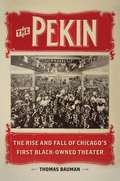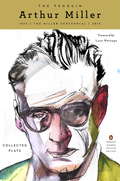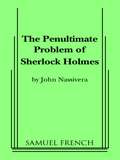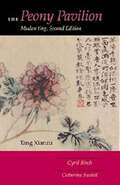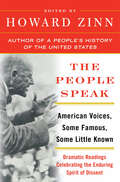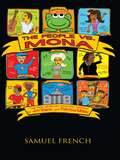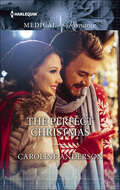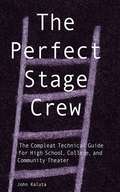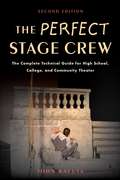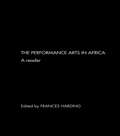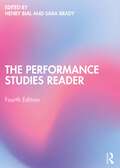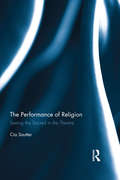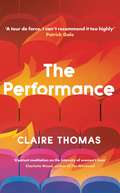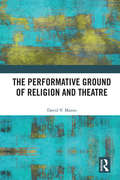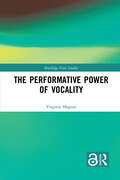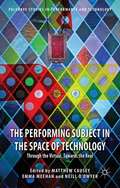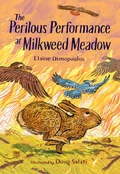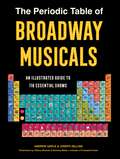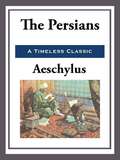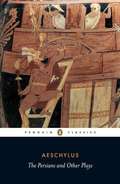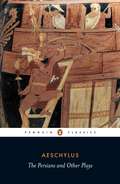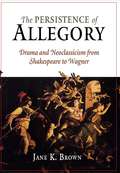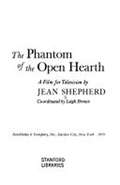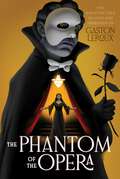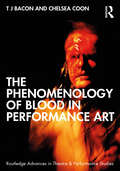- Table View
- List View
The Pekin: The Rise and Fall of Chicago's First Black-Owned Theater
by Thomas BaumanIn 1904, political operator and gambling boss Robert T. Motts opened the Pekin Theater in Chicago. Dubbed the "Temple of Music," the Pekin became one of the country's most prestigious African American cultural institutions, renowned for its all-black stock company and school for actors, an orchestra able to play ragtime and opera with equal brilliance, and a repertoire of original musical comedies. A missing chapter in African American theatrical history, Bauman's saga presents how Motts used his entrepreneurial acumen to create a successful black-owned enterprise. Concentrating on institutional history, Bauman explores the Pekin's philosophy of hiring only African American staff, its embrace of multi-racial upper class audiences, and its ready assumption of roles as diverse as community center, social club, and fundraising instrument. The Pekin's prestige and profitability faltered after Motts' death in 1911 as his heirs lacked his savvy, and African American elites turned away from pure entertainment in favor of spiritual uplift. But, as Bauman shows, the theater had already opened the door to a new dynamic of both intra- and inter-racial theater-going and showed the ways a success, like the Pekin, had a positive economic and social impact on the surrounding community.
The Penguin Arthur Miller
by Arthur Miller Lynn NottageTo celebrate the centennial of his birth, the collected plays of America's greatest twentieth-century dramatist in a beautiful bespoke hardcover edition In the history of postwar American art and politics, Arthur Miller casts a long shadow as a playwright of stunning range and power whose works held up a mirror to America and its shifting values. The Penguin Arthur Miller celebrates Miller's creative and intellectual legacy by bringing together the breadth of his plays, which span the decades from the 1930s to the new millennium. From his quiet debut, The Man Who Had All the Luck, and All My Sons, the follow-up that established him as a major talent, to career hallmarks like The Crucible and Death of a Salesman, and later works like Mr. Peters' Connections and Resurrection Blues, the range and courage of Miller's moral and artistic vision are here on full display.This lavish bespoke edition, specially produced to commemorate the Miller centennial, is a must-have for devotees of Miller's work. The Penguin Arthur Miller will ensure a permanent place on any bookshelf for the full span of Miller's extraordinary dramatic career.The Penguin Arthur Miller includes: The Man Who Had All the Luck, All My Sons, Death of a Salesman, An Enemy of the People, The Crucible, A View from the Bridge, After the Fall, Incident at Vichy, The Price, The Creation of the World and Other Business, The Archbishop's Ceiling, The American Clock, Playing for Time, The Ride Down Mt. Morgan, The Last Yankee, Broken Glass, Mr. Peters' Connections, and Resurrection Blues.From the Hardcover edition.
The Penultimate Problem Sherlock Holmes
by John NassiveraMystery Drama \ 6 m, 3 f \ Int. \ This play about the famous detective has Holmes venturing into the occult where, during a seance, he is warned that he is about to meet his maker. The play has Holmes, Waston and Prof. Moriarty meet their maker, Sir Arthur Conan Doyle, who wishes to end their existence literally with the final stroke of his pen. Holmes cannot accept the fact that he is the product of another's imagination, a mere pawn of another man's genius. Who is the creator and who the pawn becomes the central question as Holmes and the others threaten their creator with the death to which he has sentenced them. \ "A must for all the fans of Sherlock Holmes stories, the play contains startling twists and turns that keep the audience on the edge of their seats." The Resorter.
The Peony Pavilion: Mudan Ting
by Cyril Birch Tang Xianzu Catherine Crutchfield Swatek Xianzu TangThe celebrated English translation of this classic work of Chinese literature is now available in an updated paperback edition. Written in 1598 by Tang Xianzu, The Peony Pavilion is one of literature's most memorable love stories and a masterpiece of Ming drama. Cyril Birch has captured all the elegance, lyricism, and subtle, earthy humor of this panoramic tale of romance and Chinese society. When Indiana University Press first published the text in 1981, it seemed doubtful that the work would ever be performed in its entirety again, but several spectacular and controversial productions have toured the world in recent years. For this second edition, which contains a fully revised text of the translation, Cyril Birch and Catherine Swatek reflect on contemporary performances of the play in light of its history.
The People Speak: A Performance Piece
by Howard ZinnTo celebrate the millionth copy sold of Howard Zinn's great People's History of the United States, Zinn drew on the words of Americans -- some famous, some little known -- across the range of American history. These words were read by a remarkable cast at an event held at the 92nd Street YMHA in New York City that included James Earl Jones, Alice Walker, Jeff Zinn, Kurt Vonnegut, Alfre Woodard, Marisa Tomei, Danny Glover, Myla Pitt, Harris Yulin, and Andre Gregory.From that celebration, this book was born. Collected here under one cover is a brief history of America told through dramatic readings applauding the enduring spirit of dissent.Here in their own words, and interwoven with commentary by Zinn, are Columbus on the Arawaks; Plough Jogger, a farmer and participant in Shays' Rebellion; Harriet Hanson, a Lowell mill worker; Frederick Douglass; Mark Twain; Mother Jones; Emma Goldman; Helen Keller; Eugene V. Debs; Langston Hughes; Genova Johnson Dollinger on a sit-down strike at General Motors in Flint, Michigan; an interrogation from a 1953 HUAC hearing; Fannie Lou Hamer, a sharecropper and member of the Freedom Democratic Party; Malcolm X; and James Lawrence Harrington, a Gulf War resister, among others.
The People vs. Mona
by Patricia MillerMusical / 3m, 5f (Doubling) / Unit Set / The People vs. Mona revolves around Mona Mae Katt, who is accused of murdering her husband on their wedding night. The resulting trial brings out the worst and the funniest of the citizens in the tiny town of Tippo in this love story, murder mystery, courtroom shenanigans, fate-of-a-small-town-hinging-on-the-verdict musical.
The Perfect Christmas
by Caroline AndersonEmotional trauma...The trauma of their first meeting set the tone of their relationship and established their heated attractioneven before new consulting surgeon David Armstrong reached Audley Memorial Hospital.Nurse Julia Revell felt acutely alive and distinctly nervous with him on staff. Having turned her life around after a difficult marriage, she couldn’t allow herself or her little daughter, Katie, to experience another emotional nightmare. David wanted them both so much and was happy to wait—but Julia’s courage finally ran out.Then came Christmas Eve. Katie was abducted, and Julia realized how much she really needed this man at her side....
The Perfect Stage Crew: The Compleat Technical Guide for High School, College, and Community Theater
by John KalutaHere is an indispensable, nuts-and-bolts guide to putting on a stunning, low-budget show in less than 40 days! The Perfect Stage Crew explains the pitfalls to avoid and provides solutions to the most common as well as most complex stage performance problems. Readers without Broadway-size budgets and resources will learn the low-cost, low-tech approaches to painting scenery, building sets, hanging lights, setting cues, and operating sound. They'll also find crucial guidance for generating publicity, preparing tickets, technical rehearsals, and more.
The Perfect Stage Crew: The Complete Technical Guide for High School, College, and Community Theater
by John KalutaHere is a must-have book for anyone producing a stage show without a Broadway-sized budget. Written by a technical theater veteran, The Perfect Stage Crew explains the pitfalls to avoid and provides solutions to the most common-and the most complex-stage performance problems, even for theaters with a lack of resources. An invaluable guide for middle and high school theaters, college theaters, and community theaters, The Perfect Stage Crew teaches readers how to:Stock, organize, and store the essential backstage suppliesConceptualize, design, and build setsManage a stage crew effectivelyPaint scenery and backdropsTest, design, and hang lightingOperate and repair sound equipmentSet cuesPromote your showThis expanded second edition covers up-to-date technology, including for use with recording, sound, and lighting. Chapters also cover such crucial topics as running technical rehearsals, gathering props, and creating and selling tickets. Theater groups that need to learn the nuts and bolts of putting a show together will discover how to turn backstage workers into The Perfect Stage Crew.Allworth Press, an imprint of Skyhorse Publishing, publishes a broad range of books on the visual and performing arts, with emphasis on the business of art. Our titles cover subjects such as graphic design, theater, branding, fine art, photography, interior design, writing, acting, film, how to start careers, business and legal forms, business practices, and more. While we don't aspire to publish a New York Times bestseller or a national bestseller, we are deeply committed to quality books that help creative professionals succeed and thrive. We often publish in areas overlooked by other publishers and welcome the author whose expertise can help our audience of readers.
The Performance Arts in Africa: A Reader
by Frances HardingThe Performance Arts in Africa is the first anthology of key writings on African performance from many parts of the continent. As well as play texts, off the cuff comedy routines and masquerades, this exciting collection encompasses community-based drama, tourist presentations, television soap operas, puppet theatre, dance, song, and ceremonial ritualised performances. Themes discussed are: * theory * performers and performing * voice, language and words * spectators, space and time. The book also includes an introduction which examines some of the crucial debates, past and present, surrounding African performance. The Performance Arts of Africa is an essential introduction for those new to the field and is an invaluable reference source for those already familiar with African performance.
The Performance Studies Reader
by Sara Brady Henry BialSince its first publication in 2004, The Performance Studies Reader has become the leading anthology of key writings on performance studies. Now in its fourth edition, it continues to offer an unparalleled selection of work by the foremost scholars in this continually evolving field, offering a stimulating introduction to the crucial debates of Performance Studies. These critical and theoretical contributions are joined in this edition by 26 new chapters, bringing the collection up to date with current discourse and ideas, and significantly expanding the range of subjects and authors represented. Each essay includes contextual headnotes from the editors, to introduce students to the writer and their impact on the field. Newly added to this edition are contributions from Swati Arora; Sara Ahmed; Sarah Bay-Cheng; Claire Bishop; Felipe Cervera, Theron Schmidt, and Hannah Schwadron; Anita E. Cherian and Gargi Bharadwaj; Thomas F. DeFrantz/SLIPPAGE; Soyica Diggs Colbert; Tracy C. Davis; Saidiya V. Hartman; Travis Jackson; Branislav Jakovljević; Ailton Krenak; André Lepecki; Fred Moten; José Esteban Muñoz; Tavia Nyong'o; Tamara Searle; Stephanie Nohelani Teves; and McKenzie Wark.This new edition of The Performance Studies Reader provides an overview of the full range of performance theory for undergraduates at all levels, and beginning graduate students in Performance Studies, theatre, performing arts, and cultural studies.
The Performance of Religion: Seeing the sacred in the theatre
by Cia SautterThe performing arts are uniquely capable of translating a vision of an ideal or sacred reality into lived practice, allowing an audience to confront deeply held values and beliefs as they observe a performance. However, there is often a reluctance to approach distinctly religious topics from a performance studies perspective. This book addresses this issue by exploring how religious values are acted out and reflected on in classic Western theatre, with a particular emphasis on the plays put on during the Globe Theatre‘s yearlong season of 'Shakespeare and the Bible'. Looking at plays such as Much Ado About Nothing, Dr. Faustus and Macbeth, each chapter includes ethnographic overviews of the performance of these plays as well as historical and theological perspectives on the issues they address. The author also utilizes scholarship from other academics, such as Paul Tillich and Martin Buber, in examining the relationship between art and culture. This helps readers of this book to look at religion in culture, and raise questions and explore ideas about how people appraise their religious values through an encounter with a performance. The Performance of Religion: Seeing the sacred in the theatre treads new ground in bringing performance and religious studies scholarship into direct conversation with one another. As such, it is essential reading for any academic with an interest in theology, religion and ethics and their expression in culture through the performing arts.
The Performance: A Novel
by Claire Thomas'Quietly transformational'The Times 'A tour de force... I can't recommend this too highly'Patrick Gale'Innovative... an original, at-a-sitting read'Daily Mail'A potent meditation on the intensity of women's lives'Charlotte Wood, author of The Weekend'A miracle... Engaging and evocative'Washington Post'I loved and admired The Performance... Unmissable'Emma Stonex, author of The Lamplighters'Lively and intimate... The way Thomas plays with the reader is a sort of genius'Guardian'Thomas writes these women with such wisdom and compassion, that by the end we are all transformed'Claire Fuller, author of Unsettled Ground The false cold of the theatre makes it hard to imagine the heavy wind outside in the real world, the ash air pressing onto the city from the nearby hills where bushfires are taking hold.The house lights lower.The auditorium feels hopeful in the darkness.As bushfires rage outside the city, three women watch a performance of a Beckett play.Margot is a successful professor, preoccupied by her fraught relationship with her ailing husband. Ivy is a philanthropist with a troubled past, distracted by the snoring man beside her. Summer is a young theatre usher, anxious about the safety of her girlfriend in the fire zone.As the performance unfolds, so does each woman's story. By the time the curtain falls, they will all have a new understanding of the world beyond the stage.
The Performative Ground of Religion and Theatre
by David V. MasonReligious practitioners and theatregoers have much in common. So much, in fact, that we can say that religion is often a theatrical phenomenon, and that theatre can be a religious experience. By examining the phenomenology of religion, we can in turn develop a better understanding of the phenomenology of theatre. That is to say, religion can show us the ways in which theatre is not fake. This study explores the overlap of religion and theatre, especially in the crucial area of experience and personal identity. Reconsidering ideas from ancient Greece, premodern India, modern Europe, and the recent century, it argues that religious adherents and theatre audiences are largely, themselves, the mechanisms of their experiences. By examining the development of the philosophy of theatre alongside theories of religious action, this book shows how we need to adjust our views of both. Featuring attention to influential notions from Plato and Aristotle, from the Natyashastra, from Schleiermacher to Sartre, Bourdieu, and Butler, and considering contemporary theories of performance and ritual, this is vital reading for any scholar in religious studies, theatre and performance studies, theology, or philosophy.
The Performative Power of Vocality (Routledge Voice Studies)
by Virginie MagnatThe Performative Power of Vocality offers a fresh perspective on voice as a subject of critical inquiry by employing an interdisciplinary and cross-cultural approach. Conventional treatment of voice in theatre and performance studies too often regards it as a subcategory of actor training, associated with the established methods that have shaped voice pedagogy within Western theatre schools, conservatories, and universities. This monograph significantly deviates from these dominant models through its investigation of the non-discursive, material, and affective efficacy of vocality, with a focus on orally transmitted vocal traditions. Drawing from her performance training, research collaborations, and commitment to cultural diversity, Magnat proposes a dialogical approach to vocality. Inclusive of established, current, and emerging research perspectives, this approach sheds light on the role of vocality as a vital source of embodied knowledge, creativity, and well-being grounded in process, practice, and place, as well as a form of social and political agency. An excellent resource for qualitative researchers, artist-scholars, and activists committed to decolonization, cultural revitalization, and social justice, this book opens up new avenues of understanding across Indigenous and Western philosophy, performance studies, musicology, ethnomusicology, sound and voice studies, anthropology, sociology, phenomenology, cognitive science, physics, ecology, and biomedicine.
The Performing Subject in the Space of Technology
by Matthew CauseyNow that the shock of the virtual has subsided toward a 'new-normal' of computational interference in all areas of life, it is an advantageous moment to reflect on the passage through the virtual and back to the real. Digital culture has developed into a bio-virtual environment in which the categories of the biological and the virtual no longer stand as separate. The contributors to this volume respond to the questions raised by the 'after-event' of the digital through practice-led researchanalyses of performance processes, philosophical readings of the work of art and technology, and performance studies investigations of the subject in the spaces of technology. The volume examines a wide range of activities, from bio-art to internet child pornography, gaming and social networking technologies to the use of motion-tracking in developing choreography and documentation. The authors draw from diverse perspectives in dance, theatre, performance, film and music studies, digital arts and culture.
The Perilous Performance at Milkweed Meadow
by Elaine DimopoulosButternut and the meadow creatures return in this middle-grade adventure sequel that will charm animal-loving fans of The Tale of Despereaux and Clarice the Brave. Illustrated by Caldecott winner Doug Salati.After their remarkable rescue, the meadow creatures are back—now closer than ever and with beloved rabbit Butternut still captivating them all with her storytelling. But when a dazzling group of traveling turkeys shows up and persuades the meadow creatures to join them in putting on performance, Butternut is not sure she can find her place in all the excitement. She questions her storytelling abilities compared to this new crew.When it turns out the turkeys—and the grand show—are not what they seem, Butternut's family and friends are suddenly in imminent danger. Butternut must figure out how to trust herself and find help. In the end, the hope is that friendship will win once more.Beautiful and arresting black-and-white illustrations bring the animals to life in this nail-biting and heartwarming story about trust: trusting our instincts, trusting our creative talents, and trusting those who know and love us, even when it&’s hard.&“Treasured classics designed to be read aloud and shared.&”—Caroline Carlson, author of Wicked Marigold
The Periodic Table of Broadway Musicals: An Illustrated Guide to 118 Essential Shows
by Andrew Gerle Joseph ZellnikTheater lovers will adore this unique guidebook that boasts a wealth of Broadway knowledge, including adorable icons that represent each musical. Imagine the classic periodic table of elements—but instead of Chromium and Rhodium, it's A Chorus Line and RENT! This delightful and informative gift book, based on the bestselling viral poster series is a stunning showcase of art and content sure to thrill lovers of showtunes and everything Broadway and beyond. Includes a full-size pull-out poster.
The Persians
by AeschylusThe Persians is an Athenian tragedy by the ancient Greek playwright Aeschylus. First produced in 472 BC, it is the oldest surviving play in the history of theatre. It dramatises the Persian response to news of their military defeat at the Battle of Salamis (480 BC), which was a decisive episode in the Greco-Persian Wars; as such, the play is also notable for being the only extant Greek tragedy that is based on contemporary events.
The Persians And Other Plays
by Aeschylus Alan H. SommersteinAeschylus (525-456 BC) brought a new grandeur and epic sweep to the drama of classical Athens, raising it to the status of high art. The Persians, the only Greek tragedy to deal with events from recent Athenian history, depicts the final defeat of Persia in the battle of Salamis, through the eyes of the Persian court of King Xerxes, becoming a tragic lesson in tyranny. In Prometheus Bound, the defiant Titan Prometheus is brutally punished by Zeus for daring to improve the state of wretchedness and servitude in which mankind is kept. Seven Against Thebes shows the inexorable downfall of the last members of the cursed family of Oedipus, while The Suppliants relates the pursuit of the fifty daughters of Danaus by the fifty sons of Aegyptus, and their final rescue by a heroic king.
The Persians and Other Plays: The Persians / Prometheus Bound / Seven Against Thebes / The Suppliants
by AeschylusAeschylus (525-456 BC) brought a new grandeur and epic sweep to the drama of classical Athens, raising it to the status of high art. The Persians, the only Greek tragedy to deal with events from recent Athenian history, depicts the final defeat of Persia in the battle of Salamis, through the eyes of the Persian court of King Xerxes, becoming a tragic lesson in tyranny. In Prometheus Bound, the defiant Titan Prometheus is brutally punished by Zeus for daring to improve the state of wretchedness and servitude in which mankind is kept. Seven Against Thebes shows the inexorable downfall of the last members of the cursed family of Oedipus, while The Suppliants relates the pursuit of the fifty daughters of Danaus by the fifty sons of Aegyptus, and their final rescue by a heroic king.
The Persistence of Allegory
by Jane K. BrownIn an impressively comparative work, Jane K. Brown explores the tension in European drama between allegory and neoclassicism from the sixteenth through the nineteenth century. Imitation of nature is generally thought to triumph over religious allegory in the Elizabethan and French classical theater, a shift attributable to the recovery of Aristotle's Poetics in the Renaissance. But if Aristotle's terminology was rapidly assimilated, Brown demonstrates that change in dramatic practice took place only gradually and partially and that allegory was never fully cast off the stage. The book traces a complex history of neoclassicism in which new allegorical forms flourish and older ones are constantly revitalized. Brown reveals the allegorical survivals in the works of such major figures as Shakespeare, Calderón, Racine, Vondel, Metastasio, Goethe, and Wagner and reads tragedy, comedy, masque, opera, and school drama together rather than as separate developments. Throughout, she draws illuminating parallels to modes of representation in the visual arts.A work of broad interest to scholars, teachers, and students of theatrical form, The Persistence of Allegory presents a fundamental rethinking of the history of European drama.
The Phantom Of The Open Hearth
by Jean ShepherdThe Phantom of the Open Hearth: A Film for Television Co-ordinated by Leigh Brown
The Phantom of the Opera (Monstrous Classics Collection)
by Gaston LerouxA new generation of young readers is sure to delight in this enduring tale of love and torment by Gaston Leroux originally published in 1909—featuring a freshly reimagined cover!Filled with the spectacle of the Paris Opera House in the 19th century, this classic work of suspense remains a riveting journey into the dark regions of the human heart. The tale begins as an investigation into the strange stories of an &“Opera ghost,&” said to scare performers as they sit alone in their dressing rooms or walk along the building&’s labyrinthine corridors. But it isn&’t until the triumphant performance of beautiful soprano Christine Daaé that the Phantom begins his attacks—striking terror in the hearts of everyone in the theater.
The Phenomenology of Blood in Performance Art (Routledge Advances in Theatre & Performance Studies)
by T. J. Bacon Chelsea CoonThe Phenomenology of Blood in Performance Art is a major new publication that expands the philosophical contextualisation of blood, its presence and absence, across the practice of performance art from a phenomenological perspective.Edited by T. J. Bacon (she/they) and Chelsea Coon (she/her), this book moves through an established cannon of artists and beyond to ensure an inclusive representation of practices from a wider range of practitioners. First-hand interviews and conversations have been gathered from both canonical names as well as individuals who are prevalent in their communities and/or respective subcultures, but less represented within the frameworks of scholarly discourse. Each offers the opportunity to examine their experiences creating artworks and in turn contributes to the context of phenomenological examination within this publication through complementary scholarly texts from leading thinkers who frame phenomenological application to both visual art and transdisciplinary context. Featuring artists through new exclusive interviews and contributions including Marina Abramović, Jelili Atiku, Ron Athey, Franko B, Niya B, Marisa Carnesky, Chelsea Coon, Victor Martinez Diaz, Rufus Elliot, Ernst Fischer, Louis Fleischauer, Poppy Jackson, Mirabelle Jones, Andrei Molodkin, Hermann Nitsch, ORLAN, Mike Parr, Greta Sharp, tjb and Paola Paz Yee, and reference to many more. Alongside new scholarly insight by leading phenomenological and interdisciplinary art scholars and philosophers including T. J. Bacon, Chelsea Coon, Stuart Grant, Kelly Jordan, Lynn Lu, Roberta Mock, Amber Musser and Raegan Truax. Together they represent a significant exploration of intricate and dynamic responses to the cultural fabric of contemporary lived experiences across space and time through the medium of blood in performance art.This incredible analysis of this performance art will be of huge interest to students and practitioners of live art, performance art, phenomenology, and performance philosophy.
